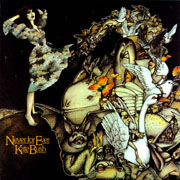
Never For Ever
Kate Bush
1980: EMI Manhattan CDP 7 46360 2
If you put all the titles from Never For Ever and Lionheart on individual strips of paper and shook them up in a hat, I probably couldn’t sort them into piles for their originating records with 100% certainty. There is a LOT of stylistic overlap. But there are on Never For Ever strong indications of the alarming developments which lay ahead in Kate’s creative paths.
Certainly there are more extremes here than before, in some ways, although Lionheart had its fair share of them but with a different overall bent. The strongest new extreme I hear in these tracks is that of the abstract expression of “Night Scented Stock” and “The Infant Kiss,” with “Army Dreamers” probably the strongest preview of things to come. (I would cite “Breathing” as well, at least those familiar with the album might expect so, but actually I think that was a one-off that never developed into a full Kate direction, unless you include “Experiment IV” as a distant thematic relative.)
So much for the big-Kate-picture summary, what about the album itself? I have a hard time thinking of this as a whole album, because the mix of Recent Kate and Arriving Kate aspects, so I’m going to just deal with individual tracks, avoiding a summing-up of the thing’s entirety. The Recent Kate tracks don’t hold my interest because the more surprising stuff is so distracting and impressive that I don’t stay with the former very long: “All We Ever Look For,” “Egypt,” “Violin,” and “Blow Away (For Bill)” are most solidly in that category, more of what we heard on Lionheart, maybe with more production trickery.
“Babooshka” is a first step toward something different, which makes its kickoff position somewhat awkward as we’re given nothing else so interestingly new for the next six songs; although its video is interesting (if not actually good) I have to say that it was unnecessary: the song is its own video, the story being solid enough to play out easily in one’s imagination. When things finally return to a glimpse of things to come, with “The Infant Kiss,” the new stuff sneaks in on tiptoe and never goes full-power, remaining at a very intensely restrained closeness that is all the more compelling for that.
The trio of “The Infant Kiss,” “Night Scented Stock,” and “Army Dreamers” is unquestionably a foretaste of both The Dreaming and The Hounds of Love and their occasional smooth linkages. What makes “The Infant Kiss” a herald of what’s to come and not just another “Wuthering Hearts” gothic excess? I don’t think I can answer that definitively, except to say that the lyrics are better expressed in the song’s mix of major and minor chordings as well as being more arresting themselves, and the song has a tenseness and sense of direction (or “plot,” if you prefer) that makes it vastly superior to the spacily manic groundlessness of “Wuthering Heights.”
And it’s beautiful, or at least beautifully sinister in its implications, and the transition into “Night Scented Stock” is absolutely spellbinding—a combination of purity, sexuality, divinity, and earthly delight. And the second song itself is utter bliss, and far too brief. For many years now I’ve had a cassette tape in my collection which is labelled simply “Diamonds” and consists of the first gently rapturous high of Kate’s vocal chordings in “Night Scented Stock” in a continuous loop for 30 minutes per side; I often take that tape with me when I travel, because it’s remarkably effective for transporting me to a place of timeless glowing meditation when the street noise outside my hotel room at 3:00 is keeping me from sleep or the gabby people near me on the transatlantic flight are impossible to not hear.
I’m not particularly obsessed one way or another about “Army Dreamers,” but I’ll say that it’s an excellent track, not just as part of the album but also a recording, as the song itself, and as the video (less excellent but still impressive). What I like most about this is its clean and relatively simple production, its quiet tone gently balancing tension and pathos with the military influence providing percussion, and of course its message of “what good was it all” that delicately underlies the whole thing. And Kate’s gently applied “country” accent is such a subtly effective touch.
I tried to avoid even mentioning “Violin,” but I must do so at last, just to get it over with: it’s unfortunate…I tend to think of it as being what prog-rockers thought the music world was heading toward in the mid-1970s. It’s an old-school instrumentalists’ fantasy of a big rock concert, in which a violin could be as effective as an electric guitar. Instead Punk kicked its way into the forefront, throwing Disco off the stage for a long time and then falling off in a confused daze as Rock roared back up there after a long hiatus (albeit with New Wave as the surprisingly legitimate transition). “Violin” therefore is a relic, an almost embarrassing track in any case, but certainly inexcusable given that it came out in 1980; even on 1978’s Lionheart it was a bit late, so why it’s on Never For Ever baffles me.
Comments © 2005 Mark Ellis Walker, except as noted, and no claim is made to the images and quoted lyrics.